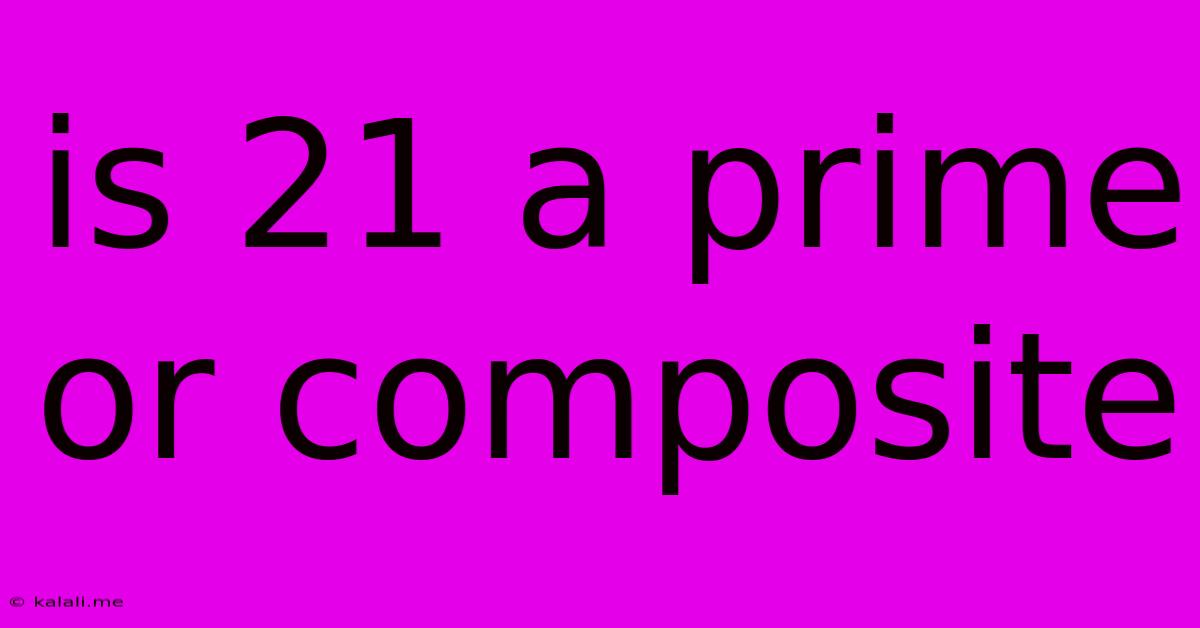Is 21 A Prime Or Composite
Kalali
May 10, 2025 · 2 min read

Table of Contents
Is 21 a Prime or Composite Number? A Comprehensive Explanation
Is 21 a prime number or a composite number? This seemingly simple question touches upon a fundamental concept in number theory. Understanding the difference between prime and composite numbers is crucial for anyone studying mathematics, and this article will clearly explain why 21 falls into the category of composite numbers.
What are Prime and Composite Numbers?
Before we determine the nature of 21, let's define our terms. A prime number is a natural number greater than 1 that has no positive divisors other than 1 and itself. Think of it as a number that's only divisible by one and itself. Examples include 2, 3, 5, 7, 11, and so on.
A composite number, on the other hand, is a positive integer that has at least one divisor other than 1 and itself. In simpler terms, it's a number that can be divided evenly by numbers besides 1 and itself. Examples are 4 (divisible by 2), 6 (divisible by 2 and 3), 9 (divisible by 3), and many more. The number 1 is considered neither prime nor composite.
Determining the Nature of 21
Now, let's analyze 21. To determine whether it's prime or composite, we need to see if it has any divisors besides 1 and itself. Let's explore its factors:
- 1 x 21 = 21: This is a trivial factorization, present in all numbers.
- 3 x 7 = 21: Here's the key. 21 is divisible by 3 and 7, both of which are whole numbers other than 1 and 21.
Because 21 has divisors besides 1 and itself (namely, 3 and 7), it definitively fits the definition of a composite number.
Why Understanding Prime and Composite Numbers Matters
The distinction between prime and composite numbers is fundamental in mathematics. They are building blocks for understanding more complex concepts such as:
- Number Theory: Prime numbers are the foundation of many theorems and concepts in number theory, a branch of mathematics dealing with the properties of integers.
- Cryptography: Prime numbers play a vital role in modern cryptography, forming the basis of many encryption algorithms that secure online communications.
- Factorization: Understanding composite numbers helps in factorizing larger numbers, a process with applications in various mathematical fields.
- Modular Arithmetic: Prime numbers are crucial in understanding modular arithmetic, a system of arithmetic for integers where numbers "wrap around" upon reaching a certain value.
In Conclusion:
21 is unequivocally a composite number because it has factors other than 1 and itself. Understanding the difference between prime and composite numbers is essential for grasping various mathematical concepts and their applications in diverse fields. This understanding provides a solid base for further exploration of number theory and its practical implications.
Latest Posts
Latest Posts
-
How Long Would It Take To Walk To China
Jul 06, 2025
-
Step Up To The Streets Final Dance
Jul 06, 2025
-
How Many Grams Is Half An Oz
Jul 06, 2025
-
How Much Is 10 Quarters In Dollars
Jul 06, 2025
-
How Do You Beat Stage 9 On Bloxorz
Jul 06, 2025
Related Post
Thank you for visiting our website which covers about Is 21 A Prime Or Composite . We hope the information provided has been useful to you. Feel free to contact us if you have any questions or need further assistance. See you next time and don't miss to bookmark.